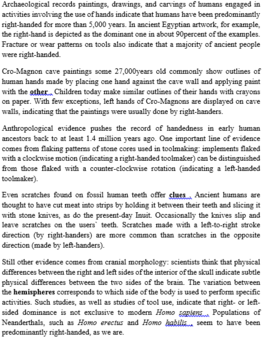Read the following passage and mark the letter A, B, C, or D on your answer sheet to indicate the correct answer to each of the questions from 35 to 42.
We find that bright children are rarely held back by mixed-ability teaching. On the contrary, both their knowledge and experience are enriched. We feel that there are many disadvantages in Streaming pupils- It does not take into account the fact that children develop at different rates. It can have a bad effect on both the bright and the not-so-bright child. After all, it can be quite discouraging to be at the bottom of the top grade!
Besides, it is rather unreal to grade people just according to their intellectual ability. This is only one aspect of their total personality. We are concerned to develop the abilities of all our pupils to the full, not just their academic ability. We also value personal qualities and social skills, and we find that mixed-ability teaching contributes to all these aspects of learning.
In our classroom, we work in various ways. The pupils often work in groups; this gives them the opportunity to learn to co-operate, to share, and to develop leadership skills. They also learn how to cope with the personal problems as well as learning how to think, to make decisions, to analyze and evaluate, to communicate effectively. The pupils learn from each other as well as from the teachers.
Sometimes the pupils work in pairs; sometimes they work on individual tasks and assignments, they can do this at their own speed. They also have some formal class teaching when this is appropriate. We encourage our pupils to use the library, and we teach them the skills they need in order to do this effectively. An advanced pupil can do advanced works; it does not matter what age the child is. We expect our pupils to do their best, not their least, and we give them every encouragement to attain this goal.
(Source: Business English Integrated Course 1, Passage 4)
According to the passage, which of the following is an advantage of mixed ability teaching?
A. Formal class teaching is the important way to give pupils essential skills such as those to be used in the library
B. Pupils can be hindered from an all-round development
C. A pupil can be at the bottom of a class
D. Pupils as individuals always have the opportunities to work on their own




Đáp án D